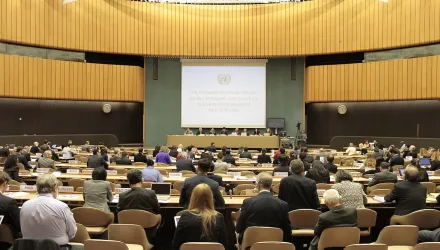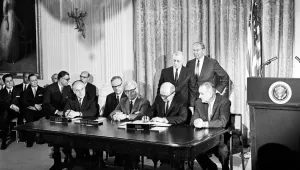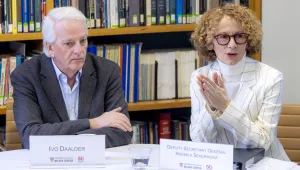Funding U.S. programs that enhance nuclear security has been a controversial issue this year in Congress. The House Armed Services Committee (HASC) recently released its version of the National Defense Authorization Act (NDAA) for Fiscal Year 2015. The results are a mixed bag on the nuclear security front. The committee proposes picking up some of the slack the Obama administration left for nonproliferation programs — increasing the administration’s request by $10 million overall — but it also slashed a key nuclear security effort and called for putting all nuclear security cooperation with Russia on hold.
If the HASC mark prevails, the Global Threat Reduction Initiative — which removes or disposes of civilian weapons-usable nuclear material, converts HEU reactors to LEU, and helps with security for research reactors in developing countries—would increase from $333 million to $413 million. This is still a reduction from the program’s current budget, but much less of a cut than the Obama administration was proposing.
| Meeting of the House Armed Services Committee (DoD/Erin A. Kirk-Cuomo photo) |
The biggest reduction in nuclear security programs was to the International Material Protection and Cooperation (IMPC) program, which helps to upgrade security for nuclear weapons and weapons-usable nuclear materials in Russia, China, South Asia, Kazakhstan, and Belarus, and also includes the Second Line of Defense effort that installs radiation detectors at key sites around the world. The Obama administration requested $305 million, which was already a 25% reduction from the previous year’s budget. The HASC proposed to reduce that amount to $129 million, or more than a 70% cut from the previous year’s budget. A little more than half of those proposed cuts were to Second Line of Defense and the rest of the cuts impact programs to upgrade security at facilities with nuclear material.
The most problematic sections of the NDAA address nuclear security cooperation with Russia. The HASC report argues that its proposed budget cuts are justified because that money would have gone towards Russian nuclear security cooperation. The HASC has also proposed a series of roadblocks that would prevent the United States and Russia from working together to prevent nuclear terrorism.
- Section 1303 of the NDAA limits the Department of Defense’s Cooperative Threat Reduction funding to Russia until the Secretary of Defense certified that Russia was “respecting the sovereignty of Ukrainian territory, no longer acting inconsistently with the Intermediate-range Nuclear Forces Treaty, and in compliance with the Treaty on Conventional Forces in Europe.”
- Section 3120 prohibits any NNSA [National Nuclear Security Administration] funds for “contact, cooperation, or transfer of technology between the United States and the Russian Federation.”
- Section 3121 prohibits the use of funds for NNSA nonproliferation activities at Russia sites until 30 days after the Secretary of Energy certifies “that such sites are not actively engaged in Russian nuclear weapons, intelligence, or defense activities.”
The silver lining is that these provisions also include waivers that would minimize the damage to nuclear security efforts. Section 1303 states cooperation can continue 30 days after the Secretary of Defense certifies “such contact or cooperation is in the national security interest of the United States;” Section 3120 allows cooperation to continue 30 days after the Secretary of Energy certifies that “such contact, cooperation, or technology transfer is in the national interests of the United States;” and Section 3121 states cooperation can continue after 30 days the President submits “a waiver for the President to submit a notification that such a waiver is in the national interests of the United States and that none of the funds will be contributed to Russia’s nuclear weapons program.” As a result of these waivers, cooperation would be suspended, but not terminated.
While the HASC committee report does acknowledge the importance of the nuclear security summit process, it appears to be conflicted on programs that actually strengthen nuclear security. For example, the HASC committee increased GTRI’s budget to “accelerate the clean-out and security upgrades in countries other than Russia.” GTRI’s ability to do so, however, would be profoundly affected by its inability to work with Russia, which is where much of the vulnerable nuclear material is sent for disposition.
The proposals throughout the bill to block nuclear security cooperation are dangerous, as they reflect a profoundly wrong view of these programs as favors the United States is giving to Russia, rather than investments in U.S. national security. There is urgent work to do to rebuild the broad base of bipartisan support that nuclear security efforts once had.
| Congresswoman Loretta Sanchez (D-CA)(Flickr/ThirdWayThinkTank photo) |
At least one member of HASC understands this idea. Congresswoman Loretta Sanchez (D-CA) added this comment to the committee report: “I believe effective cooperation with Russia remains necessary to effectively address the threat posed by vulnerable fissile material…Nuclear nonproliferation efforts that eliminate or secure this material reduce the risk of nuclear terrorism and strengthen US security.”
The Obama administration has also criticized HASC’s attempt to prevent nuclear security cooperation with Russia. In a Statement of Administration Policy, it argued “Nuclear security cooperation with the Russian Federation is in the U.S. national interest. Cooperation with Russia remains an essential element to the global effort to address the threat posed by nuclear terrorism. Critical bilateral nuclear nonproliferation activities are continuing in a number of key areas, and nuclear security is of paramount importance. The blanket restriction on the use of funds for “contact” or “cooperation” between the United States and the Russian Federation unconstitutionally interferes with the President’s constitutional authority to conduct diplomacy.”
Well-funded programs that facilitate cooperation to reduce the risk of nuclear terrorism are in the national interests of the United States, Russia, and the world. The situation in Ukraine does not change that fact. Stolen nuclear material is bad for everybody. Suspending cooperation because you are upset about an unrelated policy issue is, as my friend Kingston Reif has said, simply cutting off our nose to spite our face.
Roth, Nickolas. “Conflicting Views on Nuclear Security in House Armed Services Committee.” May 21, 2014





